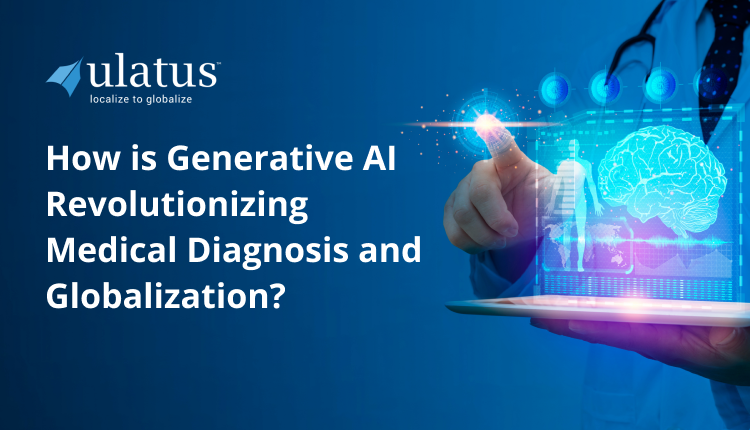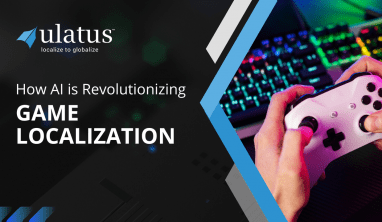Introduction
Generative AI (artificial intelligence) has brought remarkable advances in various sectors, including the medical industry. This technology is gaining significant traction globally; as of February 12, 2023, the popularity score of generative AI reached 100, and it has remained consistent since then (EnterpriseAppsToday). This technology can revolutionize patient diagnosis, personalized treatment plans, and medical translation and localization.
By 2025, according to Enterpriseapps, generative AI is predicted to contribute to 10% of all data produced globally. By 2030, the market is projected to reach a staggering $15.7 trillion, contributing to an expected increase in global GDP by 26%. Moreover, generative AI in the healthcare market is set to reach a valuation of USD 17.2 billion by 2032, according to Market.us.
This article explores how generative AI works in the medical field, its role in improving medical translation and localization, and the ethical considerations and challenges associated with implementing it in the medical industry.
How Generative AI Aids in Patient Diagnosis and Personalized Treatment Plans
Generative AI refers to AI models that generate new data based on the input provided. It employs algorithms such as Generative Adversarial Networks (GANs) and Variational Autoencoders (VAEs) to create new data by learning from existing datasets. This technology can significantly improve patient diagnosis and treatment plans in the medical industry. This ability can dramatically enhance patient diagnosis and individualize treatment plans. Some key applications of Generative AI in healthcare include:
- Data Analysis for Patient Diagnosis: Generative AI can process and analyze massive volumes of medical data, such as patient records, genetic data, and medical imaging, to assist in patient diagnosis. Example
- DeepMind’s AlphaFold uses generative AI to better comprehend the root causes of diseases by predicting protein structures.
- Creation of Personalized Treatment Plans: By harnessing a patient’s genetic predispositions, lifestyle choices, and medical history, generative AI can formulate personalized treatment strategies. Example
- Tempus is a technology company that uses AI to gather and analyze clinical and molecular data, helping doctors make more personalized treatment decisions.
- Applications in Oncology: Generative AI can also significantly contribute to oncology by offering data-driven individualized cancer treatments. Example
- IBM Watson Oncology utilizes generative AI to analyze data from diverse sources, including clinical studies and patient records, to suggest personalized cancer treatments.
- Enhanced Patient Outcomes: With generative AI technology, medical professionals can achieve improved patient outcomes. Example
- PathAI is developing technology to assist pathologists in making more accurate diagnoses, leading to more effective treatments and better patient outcomes.
Generative AI’s role in Improving Medical Translation and Localization
The expanding global nature of healthcare necessitates accurate and efficient medical translation and localization. Let’s explore how generative AI contributes to improving the precision and speed of medical translation and localization.
- Early Diagnosis and Screening: Generative AI can assist in improving medical translation and localization by enabling early diagnosis and screening. By accurately translating medical texts and patient records, generative AI helps healthcare professionals identify potential diseases, risk factors, and symptoms, leading to timely interventions and improved patient outcomes.
- Multilingual patient care: Generative AI can bridge language barriers in healthcare by providing accurate translation and localization of medical information for multilingual patients. This ensures that patients receive proper care, understand their medical conditions, treatment plans, and medications, leading to better patient-doctor communication and adherence to healthcare instructions.
- Boosting Enrollment: Generative AI can augment enrollment in health plans by offering relevant information and timely reminders, particularly during open enrollment seasons. Policyholder engagement can be amplified, and timely actions can be facilitated with generative AI, for instance, by notifying policyholders of policy modifications or necessary measures.
- Accelerating Drug Discovery: Generative AI has the potential to accelerate the drug discovery process by assisting in the translation and localization of scientific literature, clinical trial data, and research findings. By automating the translation of vast amounts of pharmaceutical and biomedical data, generative AI enables researchers and scientists to access and analyze information from different languages and regions. This facilitates faster knowledge sharing, collaboration, and identification of potential drug candidates, ultimately speeding up the drug discovery process and improving healthcare outcomes.
- Interpreting Unstructured Medical Data: Generative AI plays a vital role in interpreting unstructured medical data by extracting meaningful insights from sources such as clinical notes, research articles, and patient records. By employing natural language processing (NLP) techniques, generative AI can analyze and translate unstructured medical data into organized, actionable information, aiding healthcare professionals in decision-making, treatment planning, and research analysis.
- Fostering Novel Research Concepts: Generative AI plays a pivotal role in fostering novel research concepts in the field of By analyzing vast amounts of medical data and generating insights, it enables researchers to explore new avenues and discover previously unrecognized patterns or correlations. This capability of generative AI opens up possibilities for groundbreaking research, leading to advancements in medical understanding, diagnosis, and treatment.
Ethical Considerations and Challenges Associated with Implementing Generative AI in the Medical Industry
Data Privacy
- Issue: Generative AI’s reliance on vast quantities of sensitive patient information raises significant data privacy concerns.
- Solution: Ensuring that this data is securely stored and transmitted is essential for preserving patient trust and compliance with regulatory mandates.
- Example: Institutions can employ techniques like differential privacy, which adds “statistical noise” to data, thereby keeping individual patient information secure while enabling AI to learn from patterns in the data.
Algorithmic Bias
- Issue: Generative AI models can inadvertently reinforce or intensify existing prejudices inherent in medical datasets.
- Solution: It is crucial to allocate resources toward the ongoing refinement and assessment of AI models to counteract these biases.
- Example: To tackle algorithmic bias, ongoing audits and adjustments can be employed to ensure AI algorithms are not discriminating against certain groups. For instance, if an AI system seems to consistently disadvantage patients of a certain race or gender, a “fairness correction” can be implemented.
Misappropriation of AI-generated Insights
- Issue: The potential for abuse of AI-generated diagnoses and treatment strategies.
- Solution: Implement a system where medical experts rigorously examine and corroborate AI-generated insights.
- Example: AI-generated diagnoses can be cross-verified by a panel of doctors to ensure accuracy and maintain patient safety.
AI as a Supportive Tool
- Point: AI technologies function as instruments to support and enhance human decision-making rather than supplant it.
- Solution: Implementing solid ethical guidelines and regulatory structures can ensure the responsible and effective use of AI in healthcare.
- Example: AI could provide doctors with a “second opinion,” allowing them to compare their diagnoses with those generated by the AI, leading to better healthcare outcomes.
Conclusion
In conclusion, generative AI possesses the prodigious potential to transform the healthcare sector, particularly in patient diagnosis, individualized treatment strategies, and medical translation and localization. By tapping into the capabilities of generative AI, we stand to render healthcare more efficient, tailored, and universally accessible. Nevertheless, it is equally crucial to address the ethical ramifications and challenges accompanying its adoption conscientiously.
As we surge into an increasingly interconnected healthcare landscape, the significance of AI-driven medical translation and localization will rise exponentially. This underscores the necessity for business-to-business clients within the healthcare industry to infuse advanced AI technologies and localization solutions into their operations. Such proactive measures will ensure that the quality of their services is maintained. Still, they will also contribute to the globalization of healthcare provisions, which, in the ultimate analysis, will serve the greater good of patients across the globe.






Share your thoughts